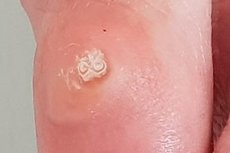Medical expert of the article
New publications
Internal callus
Last reviewed: 05.07.2025

All iLive content is medically reviewed or fact checked to ensure as much factual accuracy as possible.
We have strict sourcing guidelines and only link to reputable media sites, academic research institutions and, whenever possible, medically peer reviewed studies. Note that the numbers in parentheses ([1], [2], etc.) are clickable links to these studies.
If you feel that any of our content is inaccurate, out-of-date, or otherwise questionable, please select it and press Ctrl + Enter.

Dry core callus – Due to the presence of an intradermal core formed by a collection of dead skin keratinocytes, it is sometimes referred to as an internal callus. Although this is not an official medical term. [ 1 ]
Causes internal callus
The causes of such calluses, as well as the main risk factors for thickening of the stratum corneum of the skin, which forms a core internal callus on the foot, in the heel area, on the toe or hand, are described in detail in the publication - Core callus: causes, structure and treatment
In addition to this material, in the articles:
The pathogenesis of core (internal) callus, its key symptoms and the most common consequences and complications are considered. Here you can also learn how to diagnose them.
Who to contact?
Treatment internal callus
Read in detail about how to remove an internal callus and what remedies exist for internal calluses, as well as what surgical treatment is used to get rid of an internal callus, [ 2 ] in the following publications:
Prevention
One of the ways to prevent the formation of internal (core) calluses is to reduce body weight (that is, reduce the mechanical load on the feet), as well as comfortable shoes, for more details see - How to choose the right shoes
Forecast
If the problem with core callus is addressed in time and treatment is carried out correctly, it can be eliminated once and for all.

